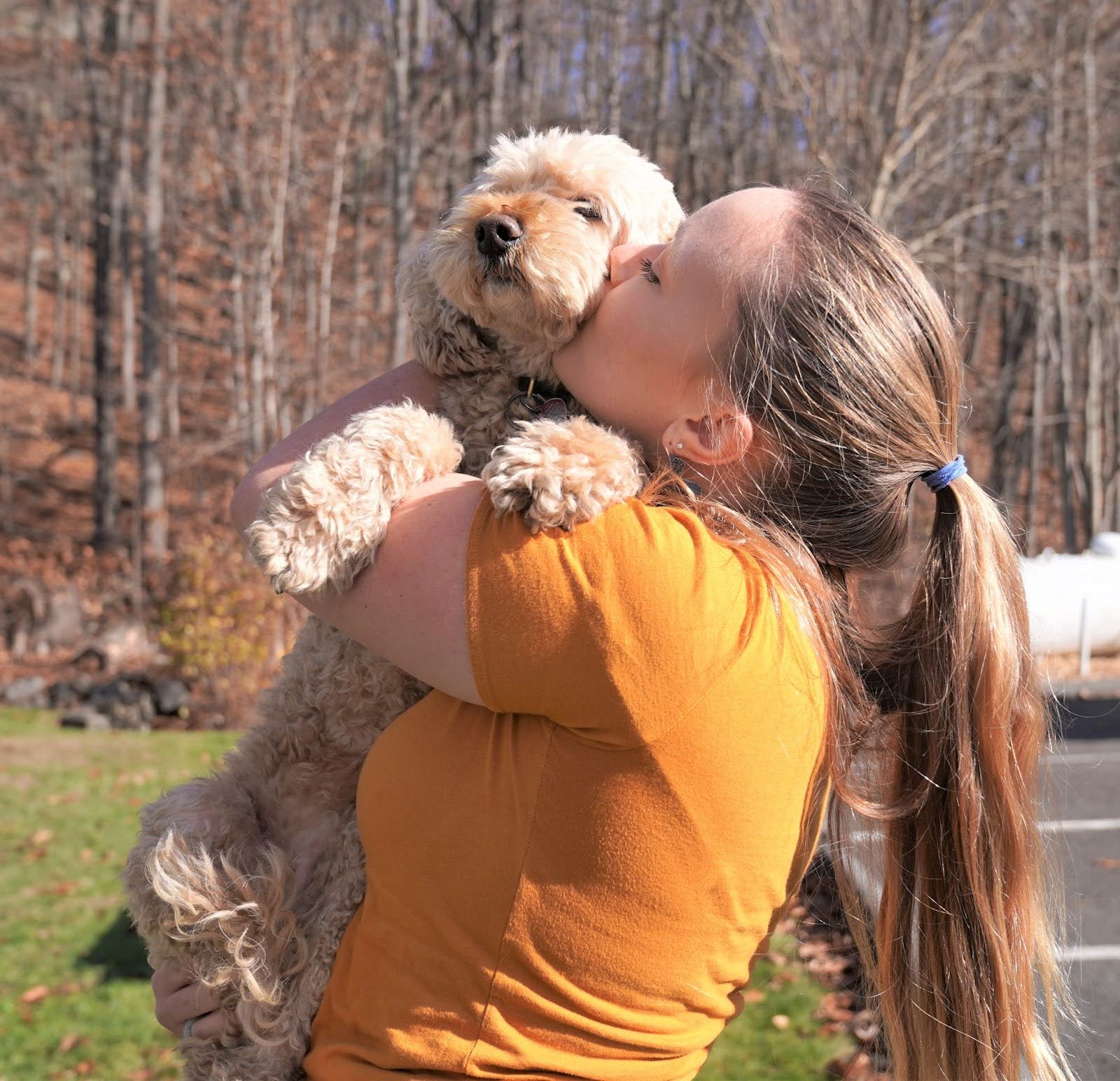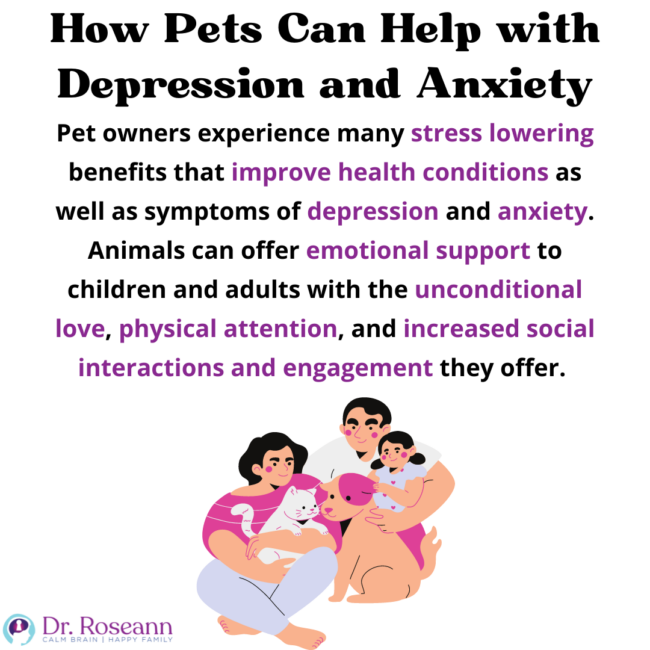Pet owners experience many stress-lowering benefits that improve health conditions as well as anxiety and depression symptoms. Animals can offer emotional support to children and adults with the unconditional love, physical attention, and increased social interactions and engagement they offer.
So how do pets reduce stress and anxiety? Well, the simple act of petting animals has been clinically shown to reduce stress, and blood pressure and decrease the probability of anxiety and depression. Dog owners and cat owners may not agree on which pet is the best but they will agree that pets are a wonderful addition to their family.
Kids today face a myriad of stressors that have led to increased levels of mental illness among our youth. Stress isn’t something that can be avoided and instead, we need to integrate ways to calm the brain to inoculate our children.
Research on Pets and Mental Health
Studies show numerous physical health benefits to having pets (Levine et al., 2013). Dogs and cats, as well as other animals and even insects as pets, have been known to improve physical and mental health.
- Improves breathing and makes it more regular
- Lowers blood pressure and hypertension
- Decreases feelings of stress
- Decreases stress hormones
- Lowers cholesterol levels
- Lowers obesity risk
- Increases physical activity
- Lowers cardiovascular response to stress
- Improved longevity for those with cardiovascular issues
What are Emotional Support Animals?
Emotional Support Animals (ESAs) are animals that offer comfort and companionship to people facing emotional or psychological challenges. Unlike service animals, ESAs are not trained for specific tasks but are prescribed by mental health professionals to provide therapeutic benefits through their presence. This prescription is typically in the form of a letter from a licensed mental health professional, indicating the individual's need for emotional support.
The best dogs for depression are retrievers, spaniels, and bulldogs, among others. But can cats sense depression and anxiety in humans too? Yes. However, ESAs are diverse in species, including not only dogs and cats but also birds, rabbits, and even miniature horses.
The right type of animal is chosen based on individual preferences and living situations. While ESAs do not undergo formal training, they should be well-behaved to ensure they do not pose a threat to others.
Individuals with ESAs may enjoy legal protections in certain jurisdictions. For example, in the United States, the Fair Housing Act (FHA) and the Air Carrier Access Act (ACAA) grant specific accommodations in housing and air travel for individuals with ESAs.
Unlike service animals, which are trained to assist with specific disabilities, ESAs serve primarily to provide emotional support. The presence of an ESA can be particularly beneficial for generalized anxiety disorder, postpartum depression, PTSD symptoms, alcoholism, addiction, and other emotional disorders. The calming effect and companionship offered by these animals can help alleviate symptoms associated with these mental health challenges.
How Do Emotional Support Animals Help With Depression and Anxiety?
Emotional Support Animals (ESAs) serve as invaluable companions for individuals navigating the challenges of severe depression and anxiety. These animals offer a unique form of unconditional support as they supply a constant source of love and companionship.
This unwavering presence is particularly crucial for those grappling with the isolating effects of chronic depression and anxiety. Interactions with ESAs, such as petting and bonding, contribute to stress reduction by lowering blood pressure and diminishing anxiety levels. The tactile engagement with these animals has a proven calming effect on the nervous system, providing a tangible coping mechanism.
Beyond emotional support, ESAs encourage physical exercise through activities like walks and play, which offer a natural remedy for symptoms associated with major depression and anxiety. The responsibility of caring for an ESA establishes a daily routine. It provides structure and purpose, which can be instrumental in managing depressive symptoms.
Socially, ESAs act as bridges, facilitating connections with others. The companionship they provide makes socialization more accessible, countering the isolation that often accompanies mental health challenges. This social aspect is particularly beneficial for individuals with conditions like social anxiety or mood disorders.
The positive impact of ESAs extends to neurotransmitters, with interactions elevating levels of serotonin and dopamine—chemicals associated with mood regulation and pleasure. As a preventive measure, research suggests that having an ESA may lower the likelihood of developing clinical depression and anxiety (Hoy-Gerlach et al., 2022).
For individuals with specific mental health conditions such as autism, ADHD, OCD, and more, ESAs offer tailored support. Their non-judgmental and supportive presence complements other therapeutic interventions, contributing to a holistic approach to mental health.
More Benefits of Pets for Anxiety and Depression
The mental health benefits of pets for children and adults are many and most children love pets. Kids with special needs or with mental health conditions such as anxiety, social anxiety, OCD, autism, ADHD, and mood disorders can benefit both mentally and physically from having an animal. Just like tools such as meditation, supplements, essential oils, or neurofeedback, pets can help to calm the brain and body whether or not your child has a clinical condition.
Increased Physical Exercise
The physical and mental health benefits of exercise are countless.
Increased Socialization
Having pets helps you get out and meet new people and makes socialization easier, which is important because isolation often worsens anxiety and depression.
Improved Companionship and Decreased Loneliness
Socializing isn’t easy for kids today and when you struggle with anxiety, depression, OCD, autism, ADHD, or other clinical issues, it is that much harder. Pets provide unconditional love and acceptance for struggling children who really need it during these difficult times.
Improved Feelings of Self-Worth and Self-Esteem
When we are loved, we simply feel better about ourselves. Pets give so much love and attention to children and that makes them feel good about themselves and can be a partner in their day-to-day learning.
Pets Improve Communication Skills
Children who have a pet to talk to have better verbal and nonverbal communication skills because they often talk to their pets.
Provide Unconditional Support
Pets are there to love and don’t criticize like a teacher, parent, or a human can.

Builds Emotional Attachment
Kids who have pets are more likely to build emotional attachments to humans, which means better relationships with others.
Greater Empathy
Studies have shown that children who have pets have greater empathy, which is an important characteristic associated with a greater sense of well-being, success, and socialization (Hodgson et al., 2015).
Builds Trust
Pets show you not just unconditional love but show you what it means to fully trust someone too. Human-animal interaction can go a long way in helping build that foundation for future trusting relationships.
Lowered Blood Pressure
Numerous studies demonstrate that petting an animal lowers blood pressure in people who are stressed or hypertensive.
Decreases Stress Hormones
When our cortisol levels get activated, we move into a fight-or-flight response. That means we are stressed and prolonged periods of stress can lead to clinical anxiety and depression.
Meets Sensory Needs
The sensory component of petting and holding pets meets the sensory needs of children who have clinical issues that cause them to be reactive to sensory inputs such as smell, taste, sound, visual, and touch.
Lowered Stress Levels
The mere act of petting an animal lowers stress levels. The combination of sensory needs being met, lowering blood pressure, and the love and attention received by an animal helps to lower stress.
Pets Calm Behavioral Children
Research shows that the use of an animal when a child is distressed helps, which is something that many parents will attest to (Nagengast et al., 1997).
Less Likely to Have Depression
Pet owners are less likely to suffer from depression than non-pet owners. Research shows a reduction in symptoms of major depressive disorder for people who have pets or therapy dogs (Hoffmann et al., 2009).
Decreases Your Chance of Anxiety
One study found that having a pet decreased the likelihood of developing clinical anxiety (Gadomski et al., 2015). The constancy of having stress-lowering support available all the time calms the brain and supports the nervous system.
Increased Positive Brain Chemicals
Playing with a dog, cat, or other pet can elevate levels of serotonin and dopamine.
Add Structure and Routine to Your Day
It is easy to feel unmotivated and tired when you are depressed or anxious and our pet’s need to give care and attention puts a natural structure in our day.
Pets Teach Responsibility
When you have to care for a pet, you have to plan and take care of it. Those skills can translate to new learning in other areas.
Pets Give Us Something to Look Forward To
The love and attention that animals give us, give us something to look forward to. That sense of being needed helps to mitigate the symptoms of depression.
Improves Movement and Coordination
For younger children or children with physical disabilities, pets can help improve independent or assisted movement.
Whether considering getting your anxious child or a child with mood or behavior problems a pet or participating in pet therapy to address the signs of depression or anxiety, human interactions with animals have many physical and mental health benefits.

Parent Action Steps
☐ Learn about ESAs and the best pets for mental health.
☐ Determine if dogs and cats helping with depression would benefit your child.
☐ Consult with experts about alternatives to anti-depression meds.
☐ Support your child through their depressive episode.
☐ Consider natural depression treatments for treatment-resistant depression.
☐ Use the Solution Matcher to find the right depression therapy for your child.
Citations
Gadomski, A. M., Scribani, M. B., Krupa, N., Jenkins, P., Nagykaldi, Z., & Olson, A. L. (2015). Pet Dogs and Children’s Health: Opportunities for Chronic Disease Prevention? Preventing Chronic Disease, 12. https://doi.org/10.5888/pcd12.150204
Hodgson, K., Barton, L., Darling, M., Antao, V., Kim, F. A., & Monavvari, A. (2015). Pets’ Impact on Your Patients’ Health: Leveraging Benefits and Mitigating Risk. The Journal of the American Board of Family Medicine, 28(4), 526–534. https://doi.org/10.3122/jabfm.2015.04.140254
Hoffmann, A. O. M., Lee, A. H., Wertenauer, F., Ricken, R., Jansen, J. J., Gallinat, J., & Lang, U. E. (2009). Dog-assisted intervention significantly reduces anxiety in hospitalized patients with major depression. European Journal of Integrative Medicine, 1(3), 145–148. https://doi.org/10.1016/j.eujim.2009.08.002
Hoy-Gerlach, J., Vincent, A., Scheuermann, B., & Ojha, M. (2022). Exploring Benefits of Emotional Support Animals (ESAs): A Longitudinal Pilot Study with Adults with Serious Mental Illness (SMI). Human-Animal Interaction Bulletin, 2022. https://doi.org/10.1079/hai.2022.0016
Levine, G. N., Allen, K., Braun, L. T., Christian, H. E., Friedmann, E., Taubert, K. A., Thomas, S. A., Wells, D. L., & Lange, R. A. (2013). Pet Ownership and Cardiovascular Risk. Circulation, 127(23), 2353–2363. https://doi.org/10.1161/cir.0b013e31829201e1
Nagengast, S. L., Baun, M. M., Megel, M., & Michael Leibowitz, J. (1997). The effects of the presence of a companion animal on physiological arousal and behavioral distress in children during a physical examination. Journal of Pediatric Nursing, 12(6), 323–330. https://doi.org/10.1016/s0882-5963(97)80058-9
Are you looking for SOLUTIONS for your struggling child or teen?
Dr. Roseann and her team are all about science-backed solutions, so you are in the right place!
Grab your complimentary copy of
147 Therapist-Endorsed Self-Regulation Strategies for Children: A Practical Guide for Parents
You can get her books for parents and professionals, including: It’s Gonna Be OK™: Proven Ways to Improve Your Child’s Mental Health, Teletherapy Toolkit™ and Brain Under Attack: A Resource For Parents and Caregivers of Children With PANS, PANDAS, and Autoimmune Encephalopathy.
If you are a business or organization that needs proactive guidance to support employee mental health or an organization looking for a brand representative, check out Dr. Roseann’s professional speaking page to see how we can work together.
Dr. Roseann is a Children’s Mental Health Expert and Licensed Therapist who has been featured in/on hundreds of media outlets including The Mel Robbins Show, CBS, NBC, PIX11 NYC, Today, FORBES, CNN, The New York Times, The Washington Post, Business Insider, Women’s Day, Healthline, CNET, Parade Magazine and PARENTS. FORBES called her, “A thought leader in children’s mental health.”

She coined the terms, “Re-entry panic syndrome” and “eco-anxiety” and is a frequent contributor to media on mental health.
Dr. Roseann Capanna-Hodge has three decades of experience in working with children, teens and their families with attention-deficit hyperactivity disorder (ADHD), autism, concussion, dyslexia and learning disability, anxiety, Obsessive Compulsive Disorder (OCD), depression and mood disorder, Lyme Disease, and PANS/PANDAS using science-backed natural mental health solutions such as supplements, magnesium, nutrition, QEEG Brain maps, neurofeedback, PEMF, psychotherapy and other non-medication approaches.
She is the author of three bestselling books, It’s Gonna Be OK!: Proven Ways to Improve Your Child's Mental Health, The Teletherapy Toolkit, and Brain Under Attack. Dr. Roseann is known for offering a message of hope through science-endorsed methods that promote a calm brain.
Her trademarked BrainBehaviorResetⓇ Program and It’s Gonna be OK!Ⓡ Podcast has been a cornerstone for thousands of parents facing mental health, behavioral or neurodevelopmental challenges.
She is the founder and director of The Global Institute of Children’s Mental Health, Neurotastic™Brain Formulas and Dr. Roseann Capanna-Hodge, LLC. Dr. Roseann is a Board Certified Neurofeedback (BCN) Practitioner, a Board Member of the Northeast Region Biofeedback Society (NRBS), Certified Integrative Mental Health Professional (CIMHP) and an Amen Clinic Certified Brain Health Coach. She is also a member of The International Lyme Disease and Associated Disease Society (ILADS), The American Psychological Association (APA), Anxiety and Depression Association of America (ADAA) National Association of School Psychologists (NASP), International OCD Foundation (IOCDF).
© Roseann-Capanna-Hodge, LLC 2023
Disclaimer: This article is not intended to give health advice and it is recommended to consult with a physician before beginning any new wellness regime. *The effectiveness of diagnosis and treatment vary by patient and condition. Dr. Roseann Capanna-Hodge, LLC does not guarantee certain results.










